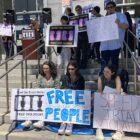By Samantha McGirr
The Public Press
As Congress debates strategies for national health care reform, the U.S. Supreme Court is preparing to determine the fate of “Healthy San Francisco,” the city’s groundbreaking health care program for the uninsured and working poor.
Despite President Barack Obama’s praise for the program, his administration did not submit any supporting arguments to the court before the July 10 deadline.
The system, in effect for the past three years, allows low-income residents to receive care at a network of hospitals and clinics throughout the city. Those at or below the poverty level pay nothing, while those with moderate incomes — up to $54,000 for a one-person household — pay a monthly fee of $450.
The program comes at a cost of $200 million per year, 80 percent of this coming from state and local taxes as well as patient payments. The city covers the remaining 20 percent by requiring large and midsize companies to contribute to their employees’ healthcare. Companies with at least 20 employees must pay $1.23 toward health insurance for every hour worked by an employee; those with 100 or more employees must pay $1.85.
The backlash from employers has been significant. The San Francisco’s Golden Gate Restaurant Association has asked the U.S. Supreme Court to invalidate the mandate to pay for care, with restaurateurs citing the financial burden of such an ordinance in a time of economic recession.
At a White House gathering in February, Obama praised the program, saying that, “Instead of just talking about healthcare, mayors like Gavin Newsom in San Francisco have been insuring that those in need receive it.”
Yet his administration did not declare formal support for Healthy SF in this current court battle, which could be decided as early as Oct. 5.
Obama’s plan for national health care reform, now being debated in the House, has drawn similar criticisms regarding uneven distribution of costs. Under this plan, a low-cost public alternative to private insurance would be partially offset by tax increases for couples making more than $350,000 a year. Critics argue that it would harm small businesses that fall into this category while doing little to curb skyrocketing health care costs.









